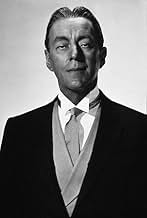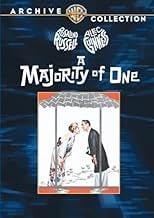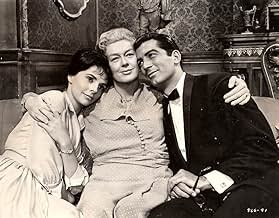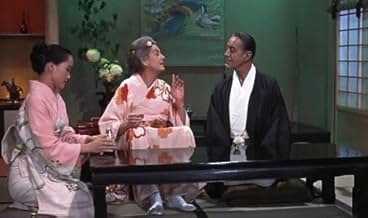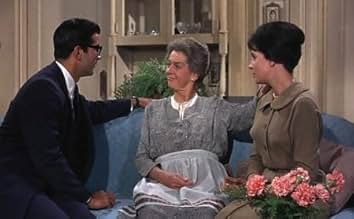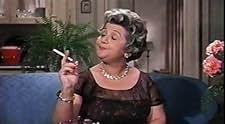AVALIAÇÃO DA IMDb
6,7/10
1,3 mil
SUA AVALIAÇÃO
Adicionar um enredo no seu idiomaA gentle love story about a Japanese businessman and widower, and a Brooklyn widow. But before a happy ending can ensue, they must learn again the lessons of tolerance, kindness, and forgive... Ler tudoA gentle love story about a Japanese businessman and widower, and a Brooklyn widow. But before a happy ending can ensue, they must learn again the lessons of tolerance, kindness, and forgiveness.A gentle love story about a Japanese businessman and widower, and a Brooklyn widow. But before a happy ending can ensue, they must learn again the lessons of tolerance, kindness, and forgiveness.
- Indicado a 1 Oscar
- 3 vitórias e 4 indicações no total
Mae Questel
- Essie Rubin
- (as Mae Questal)
Harriet E. MacGibbon
- Lily Putnam
- (as Harriet MacGibbon)
Lillian Adams
- Mrs. Stein
- (não creditado)
Leon Alton
- Ship Passenger
- (não creditado)
Monya Andre
- Ship Passenger
- (não creditado)
Mary Chan
- Spectator at Disembarkation
- (não creditado)
Spencer Chan
- Ship Passenger
- (não creditado)
Avaliações em destaque
For the first time I have seen the film A MAJORITY OF ONE. I also have been reading some of the reviews here on IMDb. So many of them harp on the fact that Alec Guinness was cast as the Japanese businessman who falls in love with Rosalind Russell's lonely Jewish widow. For that matter, some take exception to the casting of the Catholic Miss Russell as Mrs. Jacoby.
It's called acting, people! Mr. Guinness and Miss Russell certainly convinced me that they were these people - an elderly lonely Jewish widow and an equally elderly lonely Japanese widower who meet and, although from very different cultures, find a common ground.
This was a beautifully performed and profoundly moving story. I don't know how I've managed to never see it before. It left me feeling all warm and fuzzy inside. I will certainly be adding this film to my collection.
It's called acting, people! Mr. Guinness and Miss Russell certainly convinced me that they were these people - an elderly lonely Jewish widow and an equally elderly lonely Japanese widower who meet and, although from very different cultures, find a common ground.
This was a beautifully performed and profoundly moving story. I don't know how I've managed to never see it before. It left me feeling all warm and fuzzy inside. I will certainly be adding this film to my collection.
10dlcnut-1
One of the great love stories of all time. If it is possible to fall in love with a movie I fell the first time I saw it. I did not have recorder at the time. I thought it might be a time filler when I saw the listing. I like Rosalind Russell and Alec Guinness so I tuned it in. I wish I had a recorder at that time.
It is wonderful movie. It starts with two elderly bigoted, hurt and angry people who go through trials and tribulations with her family and still get together in the end. They are hurt because of family losses during World War II.
It is a quiet romantic comedy that comes off beautifully.
If you like love stories, then this movie is a must.
It is wonderful movie. It starts with two elderly bigoted, hurt and angry people who go through trials and tribulations with her family and still get together in the end. They are hurt because of family losses during World War II.
It is a quiet romantic comedy that comes off beautifully.
If you like love stories, then this movie is a must.
10mmallon4
I've never seen another love story like A Majority of One. A story of two elderly individuals who are worlds apart having to overcome their racial prejudice, as well as being one of the few films in existence about love at old age. These imperfect and flawed characters feel so real and human, and while two and a half hours may seem overlong, I believe this time is justified. I wish more films could have the level of honest storytelling on display here.
The casting as Alec Guinness as a Japanese businessman has been widely criticised but I have disagree, I thought he was perfectly convincing in the role. His character is flawed, he's not the stereotypical wise old Asian man who is full of otherworldly knowledge which he easily could have been; he makes mistakes and doesn't have the answers to everything. Unlike many Asian characters in Hollywood films, he doesn't talk in broken English or exhibit any other commonly seen Asian stereotypes. Compared to Japanese stereotypes seen in World War II propaganda films 20 years earlier, A Majority of One was certainly a sign of progress.
Why should an actor's race limit the roles they can portray? If they play a character of a different race convincingly and in a non- offence manner, I don't see any reason to be up in arms. Should the roles an actor may want to attempt be limited to only characters of their race? I feel there is a double standard at play here; for a non white actor to be cast in a role or as a character originally conceived as white it will be viewed as forward thinking and progressive; for a white actor to be cast in a non white role then it is considered racist? Film is a business and you need big stars for a movie to be box office hit; how many Asian actors where big stars to American audiences in the early 60's. A movie like A Majority of One was an initial stepping stone to more equal representation in film, perhaps it not succeed as the film was not a box office success but the intent was there.
Rosalind Russell plays a potentially unlikable bigoted character but she manages to make the role endearing with her lovable nature and witty comebacks. I didn't see her character as an exaggerated stereotype. I've seen far more exaggerated representations of Jews in other films (do I even need to list examples?). Her character has lead an ingrown life in Brooklyn, however the movie shows the younger generation of her daughter and son in law holding more progressive views and are less conservative than their elders. Russell won't enter a bedroom wither son in law inhabiting without permission in case he isn't decent; her daughter on the other hand will just walk on in. Likewise the film highlights westernised trends in Japan such as Alec Guinness wearing a western flat cap tot the popularity of American music and Hollywood movies in Japan, while still acknowledging the anti American sentiment which exists in Japan. Also this movie has Eddie, a whiny little brat but in a funny way; I love this guy.
The casting as Alec Guinness as a Japanese businessman has been widely criticised but I have disagree, I thought he was perfectly convincing in the role. His character is flawed, he's not the stereotypical wise old Asian man who is full of otherworldly knowledge which he easily could have been; he makes mistakes and doesn't have the answers to everything. Unlike many Asian characters in Hollywood films, he doesn't talk in broken English or exhibit any other commonly seen Asian stereotypes. Compared to Japanese stereotypes seen in World War II propaganda films 20 years earlier, A Majority of One was certainly a sign of progress.
Why should an actor's race limit the roles they can portray? If they play a character of a different race convincingly and in a non- offence manner, I don't see any reason to be up in arms. Should the roles an actor may want to attempt be limited to only characters of their race? I feel there is a double standard at play here; for a non white actor to be cast in a role or as a character originally conceived as white it will be viewed as forward thinking and progressive; for a white actor to be cast in a non white role then it is considered racist? Film is a business and you need big stars for a movie to be box office hit; how many Asian actors where big stars to American audiences in the early 60's. A movie like A Majority of One was an initial stepping stone to more equal representation in film, perhaps it not succeed as the film was not a box office success but the intent was there.
Rosalind Russell plays a potentially unlikable bigoted character but she manages to make the role endearing with her lovable nature and witty comebacks. I didn't see her character as an exaggerated stereotype. I've seen far more exaggerated representations of Jews in other films (do I even need to list examples?). Her character has lead an ingrown life in Brooklyn, however the movie shows the younger generation of her daughter and son in law holding more progressive views and are less conservative than their elders. Russell won't enter a bedroom wither son in law inhabiting without permission in case he isn't decent; her daughter on the other hand will just walk on in. Likewise the film highlights westernised trends in Japan such as Alec Guinness wearing a western flat cap tot the popularity of American music and Hollywood movies in Japan, while still acknowledging the anti American sentiment which exists in Japan. Also this movie has Eddie, a whiny little brat but in a funny way; I love this guy.
This is a gentle little film that may have it's faults with the hindsight of 40 years, but is enjoyable, especially I feel to those that remember the post WW11 days.
Alec Guinness plays the part beautifully, with his usual master of the character, Rosalind Russel plays a good stereotyped Jewish Mother .... the other characters just fill in between the lines. The only character that I find fault with is 'Eddy' the No. 1 boy of the family in Tokyo. He is obnoxious and completely out of character with a real 'House Boy' of the times that was lucky enough to get a 'cushy number' working for an American Diplomat.
In these days of virtual reality with sex, blood and car chases being the three main criteria of movie making, this movie is like going to a stage production from the 50's...... gentle and enjoyable.
Alec Guinness plays the part beautifully, with his usual master of the character, Rosalind Russel plays a good stereotyped Jewish Mother .... the other characters just fill in between the lines. The only character that I find fault with is 'Eddy' the No. 1 boy of the family in Tokyo. He is obnoxious and completely out of character with a real 'House Boy' of the times that was lucky enough to get a 'cushy number' working for an American Diplomat.
In these days of virtual reality with sex, blood and car chases being the three main criteria of movie making, this movie is like going to a stage production from the 50's...... gentle and enjoyable.
Looking at the film afresh as a mature adult, I'm now amazed I never realized that however excellent an actor Alec Guiness was, he simply looked ludicrous as an ersatz Japanese man. He appeared to have some sort of tightening device around his eyes so that they always looked closed! I guess that passed for generic Asian looks in those days. Too bad at the time James Shigeta was too young for the part; I kept visualizing him as an older man. That quibble aside, it is truly a heartwarming tale and well-performed by the wonderful Rosalind Russell and Mr. Guiness. Nice to see a regular-guy performance by Ran Danton, too, as the son-in-law. I'd always associated him with "Legs" Diamond and other unsavory characters he usually seemed to play. All in all, entertaining and drives home some important points about tolerance and family relations.
Você sabia?
- CuriosidadesWhen Eddie is repairing Mrs. Jacoby's TV, rather than actually shooting the scene with material already selected and pre-recorded to be seen on the TV's screen, the filmmakers used another, less expensive trick; since TV scan rates are not the same as film, whenever a TV is seen (and it's showing something being broadcast), the dark scan lines are visible (and sometimes the TV's picture will "roll"). As this was still early in the TV-era, showing TVs broadcasting was something of a novelty, but it came with the aforementioned problems. To combat this, a "TV" was built (or, more accurately, something which looked like a TV). What's being shown on the "screen"' is actually film, which is being projected from behind the scene, and with the aid of a mirror, and a semi-translucent material to give the illusion of a screen, the result is that a high-quality image is seen, and there's no problem synching camera with TV.
- Erros de gravaçãoThe steering wheel of the taxi cab is on the wrong side.
- ConexõesReferenced in The Human Jungle: Struggle for a Mind (1964)
- Trilhas sonorasWhere Am I? (Am I in Heaven?)
(uncredited)
Music by Harry Warren
Played when Mrs. Jacoby and Mr. Asano discuss the dateline and Russia on board the ship
Principais escolhas
Faça login para avaliar e ver a lista de recomendações personalizadas
Detalhes
- Data de lançamento
- País de origem
- Idiomas
- Também conhecido como
- A Majority of One
- Locações de filme
- Empresa de produção
- Consulte mais créditos da empresa na IMDbPro
- Tempo de duração2 horas 36 minutos
- Proporção
- 1.85 : 1
Contribua para esta página
Sugerir uma alteração ou adicionar conteúdo ausente

Principal brecha
By what name was Do Outro Lado da Ponte (1961) officially released in India in English?
Responda

